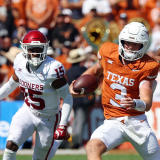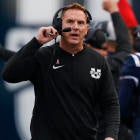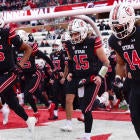TAMPA, Fla. -- Clemson didn't just win a national championship Monday night by defeating Alabama. The Tigers also provided the blueprint for how universities with less money competing in college football's multibillion-dollar industry can reach the mountaintop, too.
"That's one of the opportunities we have is to give hope to a lot of people out there, that greatness is for everyone," Clemson coach Dabo Swinney said Tuesday. "It's not just for the Alabamas and the Ohio States and the Notre Dames and the Texases. Just bloom where you're planted. Be about the right things. Be efficient."
Clemson became the first football national champion since at least 2005 ranked outside the top 20 in total athletic revenue based on the most recent figures available at this time. The Tigers were 39th in 2014-15 with $83.5 million, according to the USA Today financial database, yet defeated No. 3 Ohio State ($167.2 million) and No. 5 Alabama ($148.9 million) in the College Football Playoff.
For the longest time, college football has been dominated by blue-bloods with deep pockets, large alumni bases and strong history. Auburn sort of crashed the party in 2010 with Cam Newton, yet those Tigers were in the top 20 for revenue and flush with SEC money and exposure. Oregon came close by losing championship games in the 2010 and 2014 seasons.
None of them crashed through college football's "Moneyball" stranglehold quite like Clemson on Monday night.
"It's a testament to understanding it's still about people," Clemson athletic director Dan Radakovich said. "I think there's still pockets of places in this country where if you get the right people at the right time doing the right things, you can be incredibly successful. I really believe that. Without that, let's just look at USA Today and figure out who spends the money and those are going to be the ones that win."
To be clear: Clemson is no Cinderella. The university's athletic spending isn't anything to sneeze at and compares competitively in total football costs with most schools other than Alabama.
Still, deep pockets and large alumni historically would not describe the Tigers. Although it's growing, Clemson has the smallest undergraduate enrollment by a football national champion since Miami in 2001. That translates to athletic money, such as this info from 2014-15.
| Category | Clemson | Alabama | Difference |
| Football ticket sales | $19.7 million | $36.9 million | -$17.2 million |
| Athletic department donations | $19.7 million | $29.4 million | -$9.7 million |
| Media rights | $15.4 million | $35 million | -$19.6 million |
| Total football expenses | $27.3 million | $48.3 million | -$21 million |
"There's no doubt, if we'd have walked out there last night and brought our checkbooks, we [would have] got our butt kicked," Swinney said.
It's possible Clemson may be the outlier to win big with less available money. Plenty of universities pour dollars into football and chase the dream to raise their profile and it never really happens. Sometimes it backfires and creates embarrassing episodes for universities.
Winning isn't simply about dollars. It's also about sense.
"What's money got to do with winning?" asked former Clemson coach Danny Ford, who won the Tigers' only other national title in the 1981 season. "Notre Dame, you want to play in that sorry and dreary weather? You come to the South and play in warm, sunny weather. How does Duke win in basketball when they're a private school? It's just right now Clemson is a popular school."
Perhaps the advantages of more money don't carry the same weight they once did. There's so much money in college sports that there could be diminishing returns. Every game is televised for major schools. Clever people, such as those at Clemson, use social media to deliver creative messages right to the phones of recruits and high school coaches. That has all been part of the blueprint for Clemson.
Still, how many athletic directors would have copied the model of former Clemson athletic director Terry Don Phillips by even hiring Swinney in the first place? Swinney had never been a coordinator. How many ADs would have acted like Phillips and stuck with Swinney with a 19-15 record after two-and-a-half seasons? He had two straight convincing losses to rival South Carolina and the fans were grumbling so much even Swinney thought he would be fired.
"I laid out a vision eight years ago and said, 'Hey, we needed to change how Clemson thought,' and I remember sitting down with Terry Don Phillips, and I told him, 'Hey, look, I don't really care what you pay me,'" Swinney said. "My first contract, I didn't even read it. I just signed it. I said, 'I really don't care. Leave me on the contract that I had.' I said, 'But you've got to give me a chance to build an infrastructure here, and we've got to compete.' So [money] matters. There's no question."
For a while, Swinney took much less money than other head coaches in order to hire and retain his assistants. Over the past five years, Swinney has made only two hires on his coaching staff. Of course, he's not hurting for money and made $4.4 million this year from Clemson, the 12th-highest coach compensation in the USA Today database.
"We're incredibly competitive," Swinney said, "but if we're comparing alumni bases and things like that, I mean, heck, we go out to play Ohio State last week, and good Lord have mercy, I thought we were in Columbus when we showed up, there were so many Ohio State people there."
When told how much farther the Tigers' revenue is behind competitors, Clemson athletic director Dan Radakovich replied with a laugh, "Oh, I know."
When Radakovich became AD in 2012, he asked Swinney what he needed for football. As a senior associate AD at LSU, Radakovich experienced the buildup of LSU's program under Nick Saban with a rabid but long-suffering fan base that Radakovich found similar to Clemson's.
"Dabo believes," Radakovich said. "He's made everybody else believe and that's what makes it so special. From the first time he and I ever sat down and talked he said, 'We're gonna win here.' And I go, 'I got you.' He goes, 'No, no, you don't understand. We're gonna win here.'
"It's not just all about money. It's about being at a place that embraces college football, that embraces those seven Saturdays every year. You want to get to a place that says, 'This is important.' Dabo's been the maestro to make sure it's stayed very, very important and at a very, very high level."
Radakovich, who had been at Georgia Tech, researched the Tigers' job by drawing a two-hour circle around Clemson, a rural town in upstate South Carolina. He found seven million people within two hours, due largely to Atlanta and Charlotte being nearby with significant population bases to recruit.
"You always have to have the means of production," Radakovich said. "Maybe that's the steel worker in me from Western Pennsylvania where you have the coal and the iron ore and you put it together and make steel."
That's not to say Clemson's blueprint is easy to accomplish or even the right one for every school. For a while in the 1990s and 2000s, Clemson was divided philosophically over whether it appeared too consumed with winning football games, having gotten burned in the past.
Ford's tenure ended ugly when he was forced to resign in 1990 with a $1 million settlement. The coach who won the school's only national title in 1981 came under NCAA investigation for the second time in 12 years. Ford and the administration also butted heads on discipline, academic policies and Clemson's reluctance to build an athletic dormitory. Swinney is widely credited with uniting boosters, administrators and the board of trustees.
Fast forward to 2013 for just one example of how united everyone is there. Clemson brought in a strong recruiting class that year but lost highly recruited defensive linemen Carl Lawson and Montravius Adams to Auburn at the very end.
Clemson co-offensive coordinator Jeff Scott recently told Tiger Illustrated that Lawson and Adams said Auburn's superior housing for athletes was a major factor in their choices. So Scott snuck into Auburn player apartments after a visit with Gus Malzahn's staff to see for himself.
"Their new apartments for their players were right across from the football office," Scott told Tiger Illustrated. "I snuck into one of them and asked a player if I could take some pictures of his room. He didn't know who I was, but I'm in there taking pictures of his room."
Scott showed the pictures to Swinney and Clemson officials. Now the university is two years into phasing in $2 million into renovations for an apartment complex that houses football players and non-athletes.
Clemson's team offices used to be in a small, one-level building. The Tigers moved into the $60 million WestZone project at Memorial Stadium in 2009. Next month, they'll move into a $55 million facility (right next door to a $10 million indoor practice facility) that will include miniature golf, a bowling alley, a movie theater, a barbershop and a nap room for players.
"The best is yet to come for us," Swinney said. "I mean, this is not the end-all."
But Monday was a defining moment after 35 years. Ford, who lives on a farm in Pendleton, South Carolina, normally wakes up at 3 a.m. He couldn't fall asleep after Clemson's win over Alabama until 3 a.m.
"I was glad it's happened," said Ford, who played at Alabama and is part of the 2017 College Football Hall of Fame class. "I wish they had not played Alabama in a way. I would have been glad if Alabama had won too. Somebody asked me if it bothers me [that Clemson won]. No, truly it doesn't. It will bring more attention to our '81 team. That was the first one and they're never going to take that away. It was kind of Clemson's turn."
Still, the gap in athletic revenue between Clemson and other competitors is significant. Part of that is because other schools sponsor more sports. That doesn't explain the difference entirely.
When Clemson beat Ohio State in the semifinals, the gap in revenue between them was comparable to Clemson playing New Mexico for a spot in the national championship. Yet since 2012, the Tigers have a 19-8 record against opponents that typically rank in the top 25 for athletic revenue.
"We've come a long way, but we've earned it," Swinney said. "We've earned it. Nobody has given us anything."
No doubt. College football is a copycat world. Now Clemson has given everyone else a slice of hope -- or fool's gold, take your pick -- that they can climb the mountain, too.
















